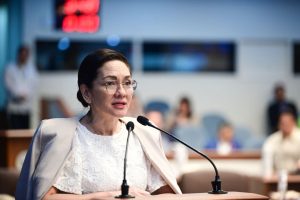Philippine President Ferdinand Marcos Jr. has pledged that “heads will roll” after Alice Guo, a disgraced small-town mayor being investigated for her alleged ties to Chinese criminal syndicates, was allowed to flee the country.
In a statement posted to his Facebook page this morning that said Guo’s departure had “laid bare the corruption that undermines our justice system and erodes public trust,” Marcos said that the authorities would “expose” those responsible for allowing the former mayor of Bamban, a town in Tarlac province, to leave the Philippines.
“A full-scale investigation is already underway, and those responsible will be suspended and will be held accountable to the fullest extent of the law,” Marcos said. “Let me be clear: Heads will roll.”
Guo is at the center of a sensational ongoing Senate investigation that is examining her links to Chinese-run Philippine Offshore Gaming Operators, known commonly as POGOs, based in Bamban. The probe has captivated the nation, with each twist and revelation receiving detailed coverage in the national press.
Marcos’ comment comes a day after the Presidential Anti-Organized Crime Commission (PAOCC) confirmed that Guo had left the country. According to immigration records, the PAOCC said, Guo arrived in Malaysia from Indonesia on July 18. She then arrived in Singapore on July 21, and travelled to the Indonesian island of Batam via ferry on August 18.
As a result, the PAOCC said the Office of the Philippine President yesterday sent a memo to the justice and foreign ministers requesting the cancellation of Guo’s passport. On Monday, the Bureau of Immigration claimed that Guo had “illegally traveled to Malaysia as early as July.”
Guo has been under scrutiny since raids in February and March, the authorities raided two illegal POGOs operating on a Bamban property allegedly owned by a company belonging to Guo. The raid in March resulted in the arrest of nine individuals allegedly involved in online scam operations and illegal human detention and rescued more than 800 victims of human trafficking who were believed to have been forced to run the scams.
The raids prompted the Senate to open an investigation into Guo’s case in May, examining her possible links to POGOs and Chinese organized crime syndicates. Researchers have subsequently burrowed into Guo’s origins, and the lead investigator, Senator Risa Hontiveros, has presented documents alleging that Guo is actually a Chinese national named Guo Huaping who was born in China and faked her identity as a Filipino. The case has also stoked the long-standing fears that Chinese-run POGOs might serve as cover for Chinese espionage operations.
For her own part, Guo has denied any wrongdoing. She says that she is a natural-born Philippine citizen and has written to the Senate to say that she was the subject of “malicious accusations.” Guo’s legal team this week claimed that they believe she is still in the Philippines.
Guo was nonetheless suspended from her post and had her financial assets frozen. She then disappeared. Last month, Senate President Francis Escudero signed warrants for the arrest of Guo and several members of her family for snubbing the Senate POGO inquiry. Hontiveros has previously claimed that Guo left the Philippines in July.
The Senate investigation has also brought increasing scrutiny on POGOs, which grew considerably under President Rodrigo Duterte during 2016-2022. POGOS are online gaming operators that serve foreign customers based outside of the Philippines. In practice, this usually means Chinese nationals living in mainland China, where gambling is banned outside Macao. Most POGO operations are also run by Chinese citizens, although they are also believed to employ as many as 25,000 Filipinos.
As in other parts of Southeast Asia, particularly Myanmar, Laos, and Cambodia, online gambling operations have been closely linked to organized criminal activities, particularly sophisticated Chinese-run “pig butchering” scam operations.
This prompted Marcos to announce a ban on POGOs during his State of the Nation speech last month, claiming that they had “ventured into illicit areas furthest from gaming such as financial scamming, money laundering, prostitution, human trafficking, kidnapping, brutal torture, even murder.”
































